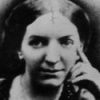Take hope from the heart of man and you make him a beast of prey.
Ouida (1839-1908) English novelist [pseud. of Maria Louise Ramé]
A Village Commune, ch. 20 (1881)
(Source)
Quotations by:
Ouida
There is no more terrible woe upon earth than the woe of the stricken brain, which remembers the days of its strength, the living light of its reason, the sunrise of its proud intelligence, and knows that these have passed away like a tale that is told.
Ouida (1839-1908) English novelist [pseud. of Maria Louise Ramé]
Folle-Farine, Book 3, ch. 3 (1871)
(Source)
The longest absence is less perilous to love than the terrible trials of incessant proximity.
It is the trifles of life that are its bores, after all. Most men can meet ruin calmly, for instance, or laugh when they lie in a ditch with their own knee-joint and their hunter’s spine broken over the double post and rails: it is the mud that has choked up your horn just when you wanted to rally the pack; it’s the whip who carries you off to a division just when you’ve sat down to your turbot; it’s the ten seconds by which you miss the train; it’s the dust that gets in your eyes as you go down to Epsom; it’s the pretty little rose note that went by accident to your house instead of your club, and raised a storm from madame; it’s the dog that always will run wild into the birds; it’s the cook who always will season the white soup wrong — it is these that are the bores of life, and that try the temper of your philosophy.
Ouida (1839-1908) English novelist [pseud. of Maria Louise Ramé]
Under Two Flags, ch. 1 (1867)
(Source)
There is nothing that you may not get people to believe in if you will only tell it them loud enough and often enough, till the welkin rings with it.
Ouida (1839-1908) English novelist [pseud. of Maria Louise Ramé]
Wisdom, Wit, and Pathos, “Friendship” (1884)
(Source)
"Welkin" is an obsolete word for "heavens."

